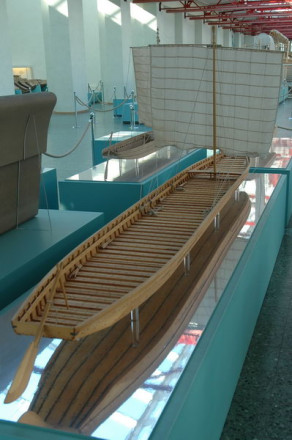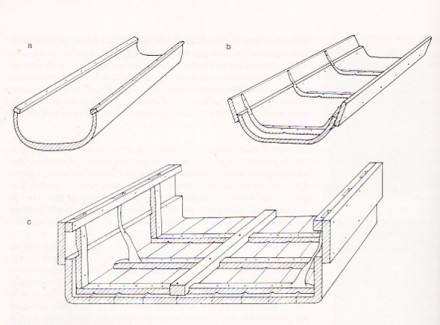History
In Zwammerdam 6 boats have been found; 3 dugout canoes and 3 barges all dating from the Roman period ca. 150-200 AD.

Vessels of the Zwammerdam type are a separate group of Rhine transport ships, used upstream as far as Switzerland within the tradition of Celtic or continental shipbuilding. Celtic shipbuilding features are: edge-to-edge planking, the absence of mortise-and-tenon joints, and clenched iron nails for fastening the ribs to the bottom.
The continental river barge is typologically connected with the dugout. Its chins are dugouts split longitudinally, or rather hollowed-out trees. To make the sides, the vertical part of such a chine is heigthened by one plank.

Description
Type: Zwammerdam barge like ships.
Length : 34 m
Width : 4.40 m
Draught: 1.20 m
93 ribs, knee-ended, in pairs and in alternate positions. Six strakes, max 21.60 m in length, 0.85 m wide and 0.10 m thick. Height of the port side of the L shaped chine max 0.85 m. Largest plank (chine) c 22.40 m in length, 0.10 m thick, 0.85 m in height, bottom part of the chine 0.25 m in width. Chine heightened by one plank. Knee-ends of the ribs and some loose uprights nailed to or inserted in the inner timber at the top of the side-board. One row of stringers nailed to the knees and the uprights.
Propulsion
Large maststep for sailing, with additional constructional features, at one-quarter distance from the stem. All fastenings are made of large iron nails, partly clenched. In plan the middle part of the ship is rectangular.

Status

Roman Castellum Nigrum Pullum in Zwammerdam. With the ships 2, 4, 6
References
- Es, W.A. van (1981).
De Romeinen in Nederland.
Fibula van Dishoeck. - Brouwers,W. Jansma, E. Manders, M. (2013).
Romeinse scheepsresten in Nederland.
Archeobrief 4.